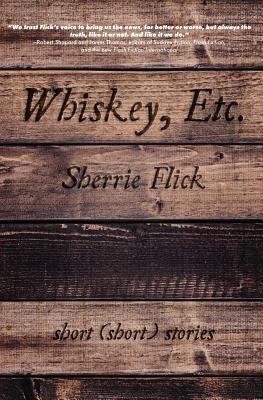Flash fiction. It’s really, really, really short fiction. Shorter than this blog post, in many cases.
There’s a famous Mark Twain quote that goes, “I didn’t have time to write a short letter, so I wrote a long one instead.”
Mark Twain agrees. Flash fiction is hard to write. How do you tell a compelling, meaningful, and impactful story in 200, 500 or even 1,000 words?

Local author Sherrie Flick has the answer in her new collection, Whiskey, Etc. At 207 pages, the collection contains 57 short short stories, most of them between one and three pages long. Some are only a paragraph, and some stretch to five or so pages. All of them will make you feel as if you are holding a small, intricately detailed world in the palm of your hand.
Flick has grouped the stories into categories: Songs, Pets, Dessert, Art, Soap, Whiskey, etc. (Get it?) These aren’t dogmatic categories, but more like loose grouping of themes and objects. Within the categories, the stories range from funny to devastating. The tone throughout is muted and quiet, but it feels like something will happen next, even if it isn’t written down.
In my opinion, the ending makes or breaks the story. And Flick nails the ending every time. Instead of closing the story, her endings open that world up to possibility and the future: “As she sets her glass on the coaster and stands, she rubs the faint curl of a red mark the glass has made on her forehead. When the steady pounding begins at her door, she swings it open wide to see what has come (84)”
The characters in these stories handle—or don’t—complex emotions. Love is not a simple yes or no, it’s a yes, but. Often, it’s not love at all, but lust or fear wrapped in satin. Revenge is not an overt or epic action, but a series of small betrayals and denials.
Details hold these miniature worlds together: “the sound of a glass bottle shattering in an alleyway, a muffled yell” (15), “moonlight spills onto the lake like tomato juice” (146), “You drive toward Wyoming with a lump in your throat, with a Tic Tac in your mouth, with a flask in your glove compartment” (160).
These small descriptions create both a physical world within the story and a lens through which to view the characters. Every word is precise and chosen with care. They echo throughout the story, creating ripples and rip tides of meaning and feeling.
As she sets her glass on the coaster and stands, she rubs the faint curl of a red mark the glass has made on her forehead. When the steady pounding begins at her door, she swings it open wide to see what has come.
Time becomes liquid in many of the stories–reaching out to the past or the future, as in “Sweet Thang,” a story about a breakup: “So lovely that I remember for the last time the first time I saw him, walking across the lawn at Suzy’s infamous BBQ. Walking so fluidly, like he could be, would be, a man in love with me some day” (5).
And in “Anna,” a story about a woman with a double life: “Long nights ooze into one another like stiff, black ink bringing thoughts about her future and how many books she hasn’t read, recipes she hasn’t tried, and friends she no longer calls” (78).
The elasticity of time is one of my favorite aspects of Whiskey, Etc., and flash fiction in general. Because space is so short, there’s no room for a traditional narrative that follows the inverted check mark you learned about in English class. Everything must be condensed, contained, and encapsulated—but not stifled or suffocated.
Doing that is the real trick, and Flick does it with ease.
Join us at CLP – Main on August 6 for an evening with the author, and while you’re waiting, dive into the miniature worlds of Whiskey, Etc.
-Kelly
Dive Into Miniature Worlds
Reserve Whiskey, Etc.Kelly reads, writes and sometimes sews, always with a large mug of tea. Her job as the Clerical Specialist at CLP – West End gives her plenty of ideas for stories that find homes in obscure literary magazines.
